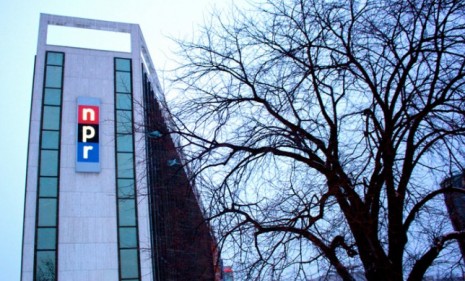Could NPR survive without federal funds?
A new scandal energizes conservatives who want to stop giving tax dollars to public radio stations. How badly would that hurt NPR?

A free daily email with the biggest news stories of the day – and the best features from TheWeek.com
You are now subscribed
Your newsletter sign-up was successful
Republicans are redoubling their efforts to cut off government funding for NPR, saying hidden-camera video of an NPR executive calling Tea Partiers "racist" proves that NPR has an unacceptable liberal bias. NPR gets less than 2 percent of its annual budget directly from the Corporation for Public Broadcasting, which receives more than $400 million a year from Congress. But the Corporation for Public Broadcasting also gives money directly to NPR member stations, which "could go dark" without the public funding. Does NPR need the government's money? (Watch a PBS discussion about NPR's future)
No. NPR will survive: We're talking about a "relatively tiny piece of money" here, says Hamilton Nolan at Gawker. Even the supposedly vulnerable local stations only stand to lose 10 percent of their funding. Layoffs and cost-cutting will prevent that from causing a "massacre." Then NPR will be able to worry about what it does best — producing "great journalism."
"It's time for NPR to get off the government payroll"
The Week
Escape your echo chamber. Get the facts behind the news, plus analysis from multiple perspectives.

Sign up for The Week's Free Newsletters
From our morning news briefing to a weekly Good News Newsletter, get the best of The Week delivered directly to your inbox.
From our morning news briefing to a weekly Good News Newsletter, get the best of The Week delivered directly to your inbox.
Wait, this could do serious damage: Anything that hurts struggling local stations hurts NPR, says Deborah Potter at American Journalism Review. About a third of the network's revenue comes from the fees member stations pay for NPR programming. If Republicans succeed in hurling those stations into a financial crisis all at once, it could be "devastating" to NPR, and valued programs such as "All Things Considered."
Actually, losing funding will help NPR: With their clumsy conservative bashing, NPR's leaders "could hardly have done a better job of persuading Congress to zero out public radio funding," says Michael Barone at the Washington Examiner. But this is a blessing. The loss "may be painful in the short run," but ultimately it will make NPR a "better organization" because it will no longer "have to worry about pleasing politicians."
"Why NPR should urge Congress to end its subsidy"
A free daily email with the biggest news stories of the day – and the best features from TheWeek.com
-
 Political cartoons for February 16
Political cartoons for February 16Cartoons Monday’s political cartoons include President's Day, a valentine from the Epstein files, and more
-
 Regent Hong Kong: a tranquil haven with a prime waterfront spot
Regent Hong Kong: a tranquil haven with a prime waterfront spotThe Week Recommends The trendy hotel recently underwent an extensive two-year revamp
-
 The problem with diagnosing profound autism
The problem with diagnosing profound autismThe Explainer Experts are reconsidering the idea of autism as a spectrum, which could impact diagnoses and policy making for the condition
-
 The billionaires’ wealth tax: a catastrophe for California?
The billionaires’ wealth tax: a catastrophe for California?Talking Point Peter Thiel and Larry Page preparing to change state residency
-
 Bari Weiss’ ‘60 Minutes’ scandal is about more than one report
Bari Weiss’ ‘60 Minutes’ scandal is about more than one reportIN THE SPOTLIGHT By blocking an approved segment on a controversial prison holding US deportees in El Salvador, the editor-in-chief of CBS News has become the main story
-
 Has Zohran Mamdani shown the Democrats how to win again?
Has Zohran Mamdani shown the Democrats how to win again?Today’s Big Question New York City mayoral election touted as victory for left-wing populists but moderate centrist wins elsewhere present more complex path for Democratic Party
-
 Millions turn out for anti-Trump ‘No Kings’ rallies
Millions turn out for anti-Trump ‘No Kings’ ralliesSpeed Read An estimated 7 million people participated, 2 million more than at the first ‘No Kings’ protest in June
-
 Ghislaine Maxwell: angling for a Trump pardon
Ghislaine Maxwell: angling for a Trump pardonTalking Point Convicted sex trafficker's testimony could shed new light on president's links to Jeffrey Epstein
-
 The last words and final moments of 40 presidents
The last words and final moments of 40 presidentsThe Explainer Some are eloquent quotes worthy of the holders of the highest office in the nation, and others... aren't
-
 The JFK files: the truth at last?
The JFK files: the truth at last?In The Spotlight More than 64,000 previously classified documents relating the 1963 assassination of John F. Kennedy have been released by the Trump administration
-
 'Seriously, not literally': how should the world take Donald Trump?
'Seriously, not literally': how should the world take Donald Trump?Today's big question White House rhetoric and reality look likely to become increasingly blurred